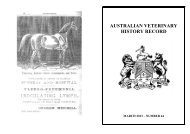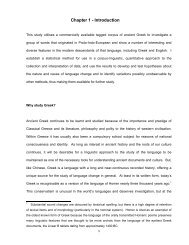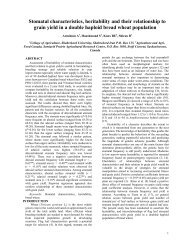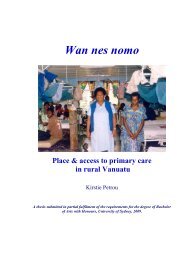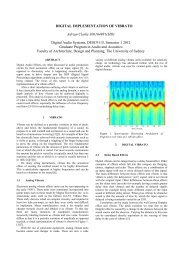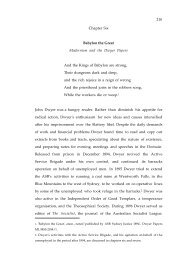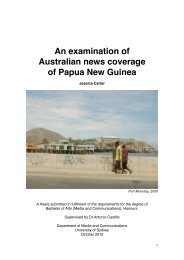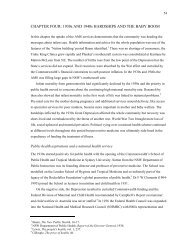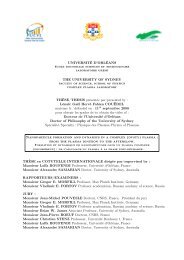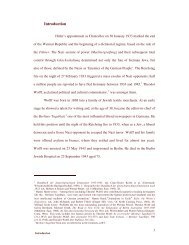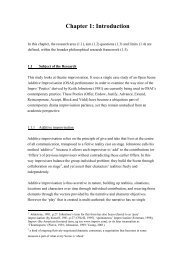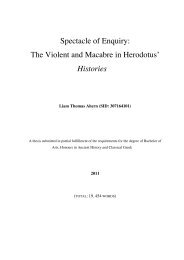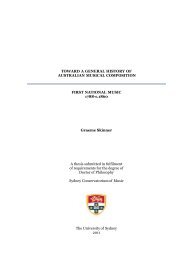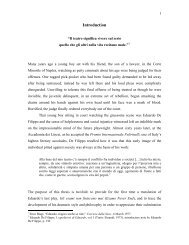journal of digital research & publishing - The Sydney eScholarship ...
journal of digital research & publishing - The Sydney eScholarship ...
journal of digital research & publishing - The Sydney eScholarship ...
You also want an ePaper? Increase the reach of your titles
YUMPU automatically turns print PDFs into web optimized ePapers that Google loves.
1 P M J O U R N A L O F D I G I T A L R ESEARCH & P UBLISHING<br />
<strong>of</strong> Google Books. <strong>The</strong> <strong>digital</strong> divide provides a major challenge to any technology seeking<br />
to equalise access to information and learning across the world, however the technology<br />
itself is a helpful tool for those who can access it in a meaningful manner.<br />
<strong>The</strong> Question <strong>of</strong> Representation<br />
Of equal concern are the broader ethical questions arising from the primacy <strong>of</strong> Google<br />
in our society’s information systems. Google is, despite its many branches across the<br />
globe, essentially an American company, it has American values and, notably, the two<br />
03R7>&'3>6$%*&4,+6$",&=77,#%&7I%>&=77,#%&g77HL*&)>%35+&7D&57'9>$,+6S&6+%&/**75$36$7"&7D&<br />
American Publishers and the Authors Guild is also both American. Due to the Google<br />
Books Settlement Agreement, only copyright laws in America have been dealt with, which<br />
results in an uneven representation <strong>of</strong> texts. Where, therefore, does the literature <strong>of</strong> the<br />
rest <strong>of</strong> the world stand in terms <strong>of</strong> representation in Google Books? As <strong>of</strong> 16/3/10, four<br />
<strong>of</strong> the six books listed as ‘Interesting’ on Google Books Home are American, and none<br />
are from continental Europe or Asia, little has changed since then, though the range is<br />
updated with great frequency. <strong>The</strong> user must ask themselves if this bias is due only to<br />
Google’s American origins, or a combination <strong>of</strong> its origins and the legalities surrounding<br />
its project.<br />
`"& 6%>0*& 7D& 6+%& #397(6& 7D& 6+%& *$6%S& $6& >%03$"*& 5+3##%",$",& 67& 4"8& 6+%& 356(3#& 57'9>$,+6&<br />
details pertaining to each text, the user can either navigate through the page views<br />
available to them or they can go to the ‘Overview’ page where full details can only be found<br />
at the end, under the heading ‘More Book Information’, notably these details are missing<br />
the copyright information found on the front page <strong>of</strong> the book itself. Google may not be<br />
violating copyright, as it has made the Google Books Settlement Agreement, however the<br />
traditional emphasis placed on the author and publication rights is greatly reduced. It<br />
could be argued that while Google Books provides greater access to the text itself, the<br />
author takes second place to the provider.<br />
Google, through its remediation <strong>of</strong> online content (Bolter, Grusin, 2000), is the creator,<br />
while authors write the works themselves; for the most part Google is the one who makes<br />
those works into an accessible online form. This is a huge shift in roles for Google, who<br />
assert that their main goal is perfecting the search function to ‘provide continuous<br />
$0'>7I%0%"6*&67&3&*%>I$5%&6+36&3#>%389&03H%*&4"8$",&$"D7>036$7"&3&D3*6&3"8&*%30#%**&<br />
experience for millions <strong>of</strong> people’ (Google 2010). Now, as a part <strong>of</strong> their mission statement,<br />
Google wishes to increase the rate <strong>of</strong> digitisation <strong>of</strong> content (Google 2010), to allow for<br />
1 1 0



